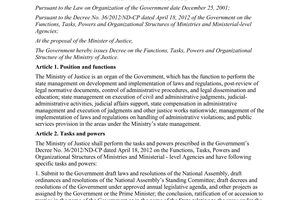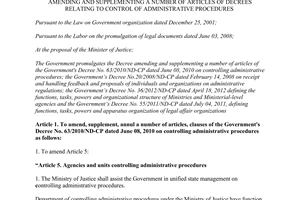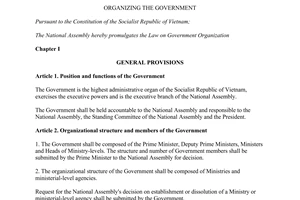Nội dung toàn văn Decree 150/2016/ND-CP defining functions tasks powers organizational structure of the Government Office
|
THE
GOVERNMENT |
THE
SOCIALIST REPUBLIC OF VIETNAM |
|
No. 150/2016/ND-CP |
Hanoi, November 11, 2016 |
DECREE
DEFINING THE FUNCTIONS, TASKS, POWERS AND ORGANIZATIONAL STRUCTURE OF THE GOVERNMENT OFFICE
Pursuant to the June 19, 2015 Law on Organization of the Government;
At the proposal of the Minister-Chairperson of the Government Office;
The Government promulgates the Decree defining the functions, tasks, powers and organizational structure of the Government Office.
Article 1. Position and functions
The Government Office is a ministerial-level agency of the Government and an apparatus assisting the Government and Prime Minister.
The Government Office functions to advise on general affairs and coordinate activities in order to assist the Government and Prime Minister (including Deputy Prime Ministers) in organizing the Government’s general activities and leading, directing and administering the operation of the Government and the state administrative system from the central to grassroots level to ensure a unified, well-functioning, continuous national administration system; control administrative procedures; provide information and build an e-government to serve the Government’s and Prime Minister’s leading, direction and administration work and provide information to the pubic in accordance with law; and ensure physical, technical and logistical conditions for the operation of the Government and Prime Minister.
Article 2. Tasks and powers
The Government Office shall perform the tasks and exercise the powers defined in the Government’s Decree No. 123/2016/ND-CP of September 1, 2016, defining the functions, tasks, powers and organizational structures of ministries and ministerial-level agencies, and has the following specific tasks and powers:
1. To advise on general affairs and coordinate activities in order to assist the Government in:
a/ Formulating and managing the Government’s work programs in accordance with law; monitoring and urging ministries, ministerial-level agencies and government-attached agencies (below referred to as ministries and sectors), People’s Committees of provinces and centrally run cities (below referred to as provincial-level People’s Committees), and related agencies and organizations in implementing the Government’s work programs and Working Regulation; summarizing and assessing the situation and results of implementation and report them to the Government;
b/ Coordinating with ministries, sectors, provincial-level People’s Committees and related agencies and organizations in preparing and finalizing schemes, projects and draft legal documents to be submitted to the Government for consideration and decision in accordance with law;
c/ Verifying the order, procedures and competence for handling and providing advices on contents of, and giving its own opinions on, schemes, projects, draft legal documents and reports under the Government’s work programs and other tasks submitted to the Government by ministries, sectors, provincial-level People’s Committees and related agencies and organizations;
d/ Assuming the prime responsibility for, and coordinating with ministries, sectors, provincial-level People’s Committees and related agencies and organizations in, preparing agendas of and serving the Government’s meetings and conferences;
dd/ Realizing working relations with agencies of the Party, National Assembly, President and Central Committee of the Vietnam Fatherland Front and central bodies of socio-political organizations, Supreme People’s Court and Supreme People’s Procuracy;
e/ Formulating schemes, projects and draft legal documents and making reports as assigned by the Government.
2. To advise on general affairs and coordinate activities in order to assist the Prime Minister in:
a/ Formulating and managing the Prime Minister’s work programs in accordance with law; monitoring, urging, summarizing, assessing and reporting on the situation and results of implementation of the Prime Minister’s work programs; and propose to the Prime Minister major and key tasks which require concentrated direction and administration in a certain period;
b/ Verifying the order, procedures and competence for handling and providing advices on contents of, and giving its own opinions on, schemes, projects, draft legal documents and reports under the Prime Minister’s work programs and other tasks submitted to the Prime Minister by ministries, sectors, provincial-level People’s Committees and related agencies and organizations;
c/ Assuming the prime responsibility for, and coordinating with ministries, sectors, provincial-level People’s Committees and related agencies and organizations in, completing contents, procedures, dossiers and draft documents to be submitted to the Prime Minister for consideration and decision, for other routine tasks submitted by ministries, sectors, provincial-level People’s Committees and related agencies and organizations;
d/ Regulating and coordinating operations among ministries, sectors and provincial- level People’s Committees in formulating and implementing policies and laws; and operations of councils, committees and interdisciplinary steering committees headed by the Prime Minister;
dd/ Proposing the Government or Prime Minister to assign ministries, sectors, provincial-level People’s Committees or related agencies and organizations to formulate mechanisms, policies, schemes, projects and draft legal documents to be submitted to competent authorities for decision; or take the initiative in studying and proposing mechanisms and policies to be submitted to the Government or Prime Minister for consideration and decision;
e/ Assuming the prime responsibility for, and coordinating with ministries, sectors, provincial-level People’s Committees and related agencies and organizations in, preparing the Government’s and Prime Minister’s work reports, explanation reports, and answers to questions raised before the National Assembly, National Assembly Standing Committee, President, competent agencies and the People according to the Prime Minister’s direction;
g/ Assuming the prime responsibility for elaborating and editing articles, speeches, media interviews, and documents serving the Prime Minister, and reports and other documents according to the Prime Minister’s direction;
h/ Monitoring, urging and inspecting ministries, sectors, provincial-level People’s Committees and related agencies and organizations in performing tasks assigned by the Government or Prime Minister; and propose to the Prime Minister necessary measures to urge the performance of such tasks, overcome limitations and ensure the observance of administrative rules and disciplines and the efficiency and effectiveness of state management;
i/ Assuming the prime responsibility for, and coordinating with ministries, sectors, provincial-level People’s Committees and related agencies and organizations in, preparing agendas of and serving the Prime Minister’s meetings, working sessions and business trips in localities and grassroots organizations;
k/ To attend meetings and conferences of ministries, sectors, provincial-level People’s Councils and People’s Committees and related agencies and organizations; to request ministries, sectors, provincial-level People’s Committees and related agencies and organizations to supply relevant documents and data and report on the performance of tasks assigned by the Government or Prime Minister; to take the initiative in working with ministries, sectors, provincial-level People’s Committees and related agencies and organizations in order to grasp the practical situation for better serving the Government’s and Prime Minister’s leading, direction and administration work;
l/ In case there remain divergent opinions on an issue submitted to the Government or Prime Minister, the Minister-Chairperson of Government Office shall assume the prime responsibility for holding a meeting with leaders of ministries, sectors, provincial-level People’s Committees and related agencies and organizations in order to reach agreement on the divergent opinions or clarify such opinions before submitting them to the Government or Prime Minister;
m/ For a dossier that is incomplete or does not comply with the prescribed order and procedures or does not fall within the Government’s or Prime Minister’s competence, to return it to the submitter, stating the reason, or forward it to a competent agency for processing;
n/ Formulating schemes, projects and draft legal documents as assigned by the Prime Minister.
3. Regarding control of administrative procedures:
a/ To guide, monitor, urge and inspect ministries, sectors and provincial-level People’s Committees in controlling administrative procedures; and summarize the situation and results of implementation and report them to the Government and Prime Minister;
b/ To assume the prime responsibility for carrying out administrative procedure reform and implementing single-window and interagency mechanisms in carrying out administrative procedures at state administrative agencies; and conducting public information on administrative procedure reform;
c/ To propose the Government or Prime Minister to assign ministries, sectors and provincial-level People’s Committees to study and propose, or take the initiative in studying and proposing, guidelines, policies, solutions and initiatives on administrative procedure reform and relevant regulations; development of new models and effective methods in administrative procedure reform to be submitted to competent authorities for decision; to assess and process results of review of administrative procedures in accordance with law;
d/ To develop and manage the National Database of Administrative Procedures;
dd/ To receive and handle organizations’ and individuals’ reports and petitions on administrative regulations under management of the Government, Prime Minister and state administrative agencies in accordance with law;
e/ To act as the standing member of the Advisory Council for Administrative Procedure Reform.
4. Regarding the building of an e-government:
a/ To assume the prime responsibility for organizing the building of an e-government to serve the Government’s and Prime Minister’s direction and administration work; to urge ministries, sectors and localities in building an e-govemment, and summarize and report on the situation and results of implementation to the Government and Prime Minister;
b/ To manage and operate the National Public Service Portal in order to integrate all online public services of ministries, sectors and localities; to submit to the Prime Minister for promulgation a list of online public services at levels 3 and 4 for application by ministries, sectors and localities on an annual basis;
c/ To manage and operate the information technology system (information system) serving the Government’s and Prime Minister’s direction and administration work; to assume the prime responsibility for connecting, coordinating, integrating and sharing information between the Government Office and ministries, sectors and localities to serve the Government’s and Prime Minister’s direction and administration work in accordance with legal documents, standards, technical regulations and Vietnam’s e-government architecture framework.
5. Regarding provision of information:
a/ To provide information for the Government’s and Prime Minister’s leading, direction and administration work; to make regular and irregular reports under regulations and at the request of the Prime Minister;
b/ To inform cabinet members, heads of government-attached agencies, chairpersons of provincial-level People’s Councils and People’s Committees, Party and State agencies, and related agencies and organizations of the national socio-economic situation, and the Government’s and Prime Minister’s leading, direction and administration work;
c/ To provide information to the public on the Government’s and Prime Minister’s major activities and important decisions, outstanding economic, political and social events of public concern and other information in accordance with law and under the Prime Minister’s direction;
d/ To receive information from the public and take the initiative in monitoring and grasping the practical situation in order to promptly advise and propose the Government or Prime Minister for considering and directing the handling of urgent and burning issues of public concern;
dd/ To perform the task of making statements of the Government and Prime Minister; to assume the prime responsibility for holding the Government’s press conferences under regulations;
e/ To manage, publish and distribute Cong Bao (the Official Gazette) of the Socialist Republic of Vietnam;
g/ To manage the organization and operation of the Government Portal.
6. To ensure physical, technical and logistical conditions for activities of the Government and Prime Minister.
7. To formulate and promulgate legal documents and other documents within its competence in accordance with law.
8. To examine documents and process documents showing signs of unlawfulness within its competence in accordance with law.
9. To receive and process documents submitted by ministries, sectors, provincial-level People’s Committees, or related agencies and organizations to the Government or Prime Minister; to distribute and manage documents of the Government and Prime Minister.
10. To carry out inspection, examination, reception of citizens, settlement of complaints and denunciations, corruption prevention and control, and thrift practice and waste combat in accordance with law.
11. To review and provide professional guidance on clerical work for offices of ministries, sectors and provincial-level People’s Committees.
12. Regarding civil servants:
a/ The Government Office’s civil servants must possess good political and ethical qualities, high professional qualifications and a thorough knowledge about the sectors and domains under their charge; and are entitled to particular preferential policies in accordance with law;
b/ The Government Office may propose within its competence the transfer, rotation and secondment of civil servants from ministries, sectors, agencies or localities to the Government Office and from the Government Office to ministries, sectors, agencies or localities according to the Prime Minister’s regulations and law.
Ministries, sectors, agencies and localities shall create conditions for civil servants to be transferred, rotated or seconded at the request of the Government Office.
13. To manage its organizational apparatus and payrolls of civil servants, the number of public employees and working positions; to decide on the recruitment, appointment, relief from duty, dismissal, permission for resignation, suspension from work, transfer, rotation, evaluation, planning, work cessation, retirement, commendation and disciplining; to implement regimes and policies and provide training and retraining for its cadres, civil servants and public employees under its management in accordance with law.
14. To manage finance, assets and other resources assigned to it; to manage scientific research activities; to implement international cooperation in accordance with law.
15. To perform other tasks and exercise other powers assigned by the Government or the Prime Minister or according to law.
Article 3. Organizational structure
1. The Department for Monitoring Inspection, Settlement of Complaints and Denunciations and Corruption, Smuggling, Trade Fraud and Counterfeit Prevention and Combat (referred to as Department I).
2. The Internal Affairs Department.
3. The Department for the National Assembly, Localities and Mass Organizations Affairs.
4. The General Affairs Department.
5. The Department for State Administrative Organization and Public Duties.
6. The Legal Department.
7. The International Relations Department.
8. The Department for Industry.
9. The Department for Agriculture.
10. The Department of General Economy.
11. The Department for Science, Education and Cultural-Social Affairs.
12. The Enterprise Renewal Department.
13. The Secretariat-Editorial Department.
14. The Administrative Affairs Department.
15. The Organization and Personnel Department.
16. The Planning and Finance Department.
17. The Agency of Administrative Procedure Control.
18. The Administration Agency.
19. Administrative Affairs-Administration Agency II.
20. The Government Portal.
21. The Informatics Center.
The units referred to in Clauses 1 thru 20 of this Article are administrative units and the unit referred to in Clause 21 is a public non-business unit attached to the Government Office.
The Department for Monitoring Inspection, Settlement of Complaints and Denunciations and Corruption, Smuggling, Trade Fraud and Counterfeit Prevention and Combat has 3 divisions; the Administrative Affairs Department, 5; the Organization and Personnel Department, 3; and the Planning and Finance Department, 3.
The Agency of Administrative Procedure Control has 5 divisions; the Administration Agency, 9; and the administrative Affairs-Administration Department II, 5.
The Minister-Chairperson of the Government Office shall submit to the Prime Minister for promulgation a decision defining the functions, tasks, powers and organizational structure of the Government Portal and a list of other public non-business units attached to the Government Office.
The Minister-Chairperson of the Government Office shall promulgate a decision defining the functions, tasks, powers and organizational structures of units attached to the Government Office, except the unit referred to in Clause 20 of this Article.
Article 4. Implementation provisions
1. To remove the phrase “control of administrative procedures” in Article 1 of the Government’s Decree No. 22/2013/ND-CP of March 13, 2013, defining the functions, tasks, powers and organizational structure of the Ministry of Justice.
2. To replace the phrase “the Ministry of Justice” with the phrase “the Government Office”, and the phrase “the Minister of Justice” with the phrase “the Minister-Chairperson of the Government Office” in Clauses 1, 2, 6, 8, 9, 10 and 11 and at Point b, Clause 12, Article 1 of the Government’s Decree No. 48/2013/ND-CP of May 14, 2013, amending and supplementing a number of articles of the Decrees concerning control of administrative procedures.
Article 5. Effect and implementation responsibility
1. This Decree takes effect on December 15, 2016.
2. The Government’s Decree No. 74/2012/ND-CP of September 29, 2012, defining the functions, tasks, powers and organizational structure of the Government Office, ceases to be effective on the effective date of this Decree.
3. To annul Points a, b, c, d, e and g, Clause 10, and Point b, Clause 28, Article 2, and Clause 14, Article 3, of the Government’s Decree No. 22/2013/ND-CP of March 13, 2013, defining the functions, tasks, powers and organizational structure of the Ministry of Justice.
4. To annul Point a, Clause 12, Article 1, and Clause 1, Article 2, of the Government’s Decree No. 48/2013/ND-CP of May 14, 2013, amending and supplementing a number of articles of the Decrees concerning control of administrative procedures.
5. Ministers, heads of ministerial-level agencies, heads of government-attached agencies and chairpersons of provincial-level People’s Committees shall implement this Decree.-
|
|
ON BEHALF OF
THE GOVERNMENT |




